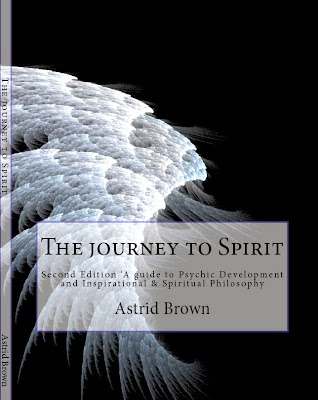The website of Author/Writer and Psychic Medium Astrid Brown. Making the most of 'YOU' i.e. how to achieve well-being and beauty from within ourselves holistically.
On Amazon
 | Astrid Brown (Author) Find all the books, read about the author, and more. See search results for this author |
Google Website Translator Gadget
FB PLUGIN
Traffic: google-analytics.com
Pages
- Home
- BIOGRAPHY
- PSYCHIC DEVELOPMENT
- WORKING WITH SPIRIT
- BOOK OF SHADOWS
- QUESTIONS AND ANSWERS ON ALL ASPECTS OF PSYCHIC MEDIUMSHIP
- TAROT CLASS
- ASTROLOGY
- INNER BEAUTY/PHILOSOPHY
- HOLISTIC THERAPIES/STRESS SOLUTIONS
- STRESS AND HEALTH
- MENTAL HEALTH
- SIMPLE ANATOMY AND PHYSIOLOGY FOR BEGINNERS
- SKIN CARE/GROOMING/COSMETICS
- MY AMAZON AUTHOR PAGE
- FOLLOW ME ON TWITTER
- FACEBOOK PAGE
The website of Author/Writer and Psychic Medium Astrid Brown. Making the most of 'YOU' i.e. how to achieve well-being and beauty from within ourselves. A truly holistic blog providing information on all aspects of psychic mediumship, spiritualism, philosophy, holistic therapies, nutrition, health, stress, mental health and beauty with a little bit of Wicca for good measure. Feeling and looking good is as much a part of how we feel inside as the outside.
Twitter /Pinterest follow
SITE HITS
COPYRIGHT NOTICE
I am a great believer in Karma, but just what is it? Karma comes from the Sanskrit and ancient Indian Language with the underlying principal that every deed in our lives will affect our future life. For example, if we treat others badly during our lifetime we will have negative experiences later on in that lifetime or in future lifetimes. Likewise, if we treat others well we will be rewarded by positive experiences.
Featured post
THE DANGERS OF INEXPERIENCED PSYCHICS/MEDIUMS
Today I am blogging about inexperienced Psychics/Mediums. There are many psychics/mediums around who give the profession a bad name, t...

Search This Blog
Saturday 18 August 2012
OVER ON MY WRITING BLOG: ASTRIDESTELLA.ORG: FOR I AM YOUR WILLING CAPTIVE
Tuesday 14 August 2012
JUST WHAT WE LOVE TO HEAR---CHOCOLATE CAN STAVE OFF DEMENTIA
Could chocolate stave off dementia? Daily dose could help keep condition at bay
- In tests consuming cocoa every day helped improve mild cognitive impairment in the elderly
- Chocolate contains flavanols – chemicals associated with a decreased dementia risk
A daily dose of chocolate could help keep dementia and Alzheimer's at bay, a study suggests.
Researchers found that consuming cocoa every day helped improve mild cognitive impairment – a condition involving memory loss which can progress to dementia or Alzheimer's – in elderly patients.
For the study, 90 people aged 70 or older diagnosed with mild cognitive impairment were split into three groups of 30 and given either a high, medium or low dose of a cocoa drink daily.
The participants' diet was restricted to eliminate other sources of flavanols, such as tea or red wine.
Their cognitive function was examined using tests of factors including working memory and processing speed.
Researchers found those who drank the high and medium doses daily had significantly better cognitive scores by the end of the eight-week study in a number of categories, including working memory.
Insulin resistance and blood pressure also decreased in those drinking high and medium doses of the flavanol drink.
Doctor Giovambattista Desideri of the University of L'Aquila in Italy, lead author of the study, said: 'This study provides encouraging evidence that consuming cocoa flavanols, as a part of a calorie-controlled and nutritionally-balanced diet, could improve cognitive function.
Dr Laura Phipps, of Alzheimer's Research UK, said: 'Cocoa-based treatments for brain function would likely have patients queuing out the door, but this small study of flavanols is not yet conclusive.'
SOME GOOD NEWS!
- Lower Blood Pressure: Studies have shown that consuming a small bar of dark chocolate everyday can reduce blood pressure in individuals with high blood pressure.
- Lower Cholesterol: Dark chocolate has also been shown to reduce LDL cholesterol (the bad cholesterol) by up to 10 percent.
- it tastes good
- it stimulates endorphin production, which gives a feeling of pleasure
- it contains serotonin, which acts as an anti-depressant
- it contains theobromine, caffeine and other substances which are stimulants
- Oleic Acid is a healthy monounsaturated fat that is also found in olive oil.
- Stearic Acid is a saturated fat but one which research is shows has a neutral effect on cholesterol.
- Palmitic Acid is also a saturated fat, one which raises cholesterol and heart disease risk.
Good news for chocaholics: Scientists replace fat with FRUIT JUICE to create healthy chocolate bars
Saturday 11 August 2012
RECOMMENDED PRODUCTS (A BEAUTY BLOG)
This is great and very finely milled and a fraction of the cost of some, and I have to say better than high end brands.
High Definition Powder
The high definition loose powder creates a "soft focus" effect to the skin. Masks fine lines and imperfections for a radiant complexion. The incredibly soft and invisible powder is great for on-screen and everyday wear.

I love this too and again a fantastic price and works beautifully.
Foundation
Our weightless mineral foundation will help get you on your way to healthier illuminating skin. All our powders blend naturally into the skin, and are so light that they work with your skin colour to create a perfect colour match. All of our foundations contain sun protection factor (spf) 15 and are 100% mineral based with no parabens, no preservatives and no chemical dyes.

Another great little product, I've tried the brown one (coffee) and comes with a great little brush for fool proof application
Cream Eyeliner
Creates smooth lines that are defined and precise. Smudge-proof, budge-proof and water-resistant coverage for all day wear to combat against, sweat, tears and rain!
.jpeg)
Now I like this and it works well around my eyes, I don't have 'crow's feet' but I do have a few fine lines under my eyes as my skin is not as firm in this area as it used to be after all I'm 55. I do like the MAC one better for frown lines and that's only because this one by ELF is more suited to dry skin and my skin is still oily and is probably why my skin as stood up to the ravages of time. Now if ELF was to do one for us oily skin customers I would be first in the que! However it's a good product none the less.
Wrinkle Refiner
Instantly smooth, soften and virtually fill in laugh lines, crow’s feet and wrinkles for a flawless finish. Key ingredients draw in moisture to smooth and plump delicate skin for a rejuvenated and youthful look. The rich blend of Wheat Protein, Horse Chestnut, Caffeine, Edelweiss, Chamomile, Shea, Mango and Vitamins A & E retexturise skin and can help prevent future damage and premature ageing.
Now all of these products are inexpensive, so you can easily afford these and more and ELF is available in quite a few countries now by clicking the flag of the appropriate country at the top of their home page.
Thursday 9 August 2012
THE LINK BETWEEN A CHILDHOOD BUMP ON THE HEAD AND DEPRESSION
Depressed? Always tired? It could all be down to a childhood bump on your head
Tuesday 7 August 2012
DOES SHAPE AND SIZE MATTER?
LONDON (Reuters) - American weightlifter Holley Mangold tips the scales at 346 pounds (157 kilograms) and she is proud of being the heaviest woman at the London Olympics.
Mangold, 22, who competed in the women's 75 kilogram-plus division, is one of growing number of women athletes speaking out at their frustration with the public scrutiny of their body size and image rather than their fitness and skills.
At the 2012 Olympics, a list of top female athletes have hit back at critics who have called them fat including British heptathlon champion Jessica Ennis, Australian swimmer Liesel Jones, and the Brazilian women's soccer team.
For Mangold, her weight is a something to be proud of.
"Between my team mate (Sarah Robles) and I, I think we both showed you can be athletic at any size," said Mangold whose Twitter profile has the tagline "Loving life and living big!"
"I'm not saying everyone is an athlete but I am saying an athlete can come in any size."
Mangold, who suffered a wrist injury three weeks ago, came 10th in a field of 14 on Sunday, watched by her NFL-playing brother Nick, centre for the New York Jets. Robles came seventh.
The 2012 Olympics have been hailed as the 'Women's Games' for including women in all sports and from all national teams with campaigners hoping this will lead to more role models in sport and increase female participation in physical activity.
The Women's Sport and Fitness Foundation (WSFF), a UK charity aiming to get more women into sport to build self-esteem and confidence, said only 12 percent of British girls at age 14 were doing enough exercise to meet recommended guidelines.
WSFF Chief Executive Sue Tibballs said their research found negative body image was consistently cited as a barrier for girls participating in exercise as popular culture gave out the message it was more important to be thin than fit.
She said this negative attitude over body image was also applied to women athletes at the Olympics who are in peak physical condition with healthy body images but still come under fire for being fat.
EATING DISORDERS RIFE
"Women athletes will regularly get comments about their appearance although men won't," said Tibballs.
"This really adds to the pressure on women athletes, many of whom already have a disordered attitude towards foods because they are in a controlled routine where weight is a key issue."
British triathlete Hollie Avil, who competed at the 2008 Beijing Olympics, quit high-level sports in May for the sake of her health after the recurrence of an eating disorder brought on by a coach telling her she was too fat.
Tibballs said it was hard to believe that Ennis, poster girl of the London Games with a rippling washboard stomach, was called fat and accused of carrying too much weight by a high-ranking UK athletics official ahead of the Games.
Ennis, 26, won gold for Britain on Saturday.
Australia's three-times gold medallist swimmer Leisel Jones's figure was questioned by some Australian media before London, who suggested she did not look as fit as at Beijing in 2008.
This sparked an angry reaction from team mates and an online uproar about body image and what constitutes fit or fat.
"I'm embarrassed by the Aussie media having a go at Leisel, one of Australia's greatest Olympians. Support athletes don't drag them down," fellow swimmer Melanie Schlanger tweeted.
"U can't judge fitness from looks anyway and how about we don't criticize at all."
Jones helped Australia win a silver medal in the medley relay in London.
British swimmer Rebecca Adlington, who won two bronze medals at London, told reporters she was going to avoid reading Twitter comments during the Olympics because so many were insults about her appearance.
The Brazilian women's soccer team were called "a bit heavy" by the coach of the Cameroon team after the South Americans won their game against the African nation 5-0.
British weightlifter Zoe Smith won fans when she hit back at attacks on Twitter saying she looked like a "lesbian" and a "bloke", addressing her critics as "chauvinistic, pigheaded blokes who feel emasculated (as) we .. are stronger than them".
"We don't lift weights in order to look hot," said 18-year-old Smith, who set at new British record at London where she came 12th in the women's 58kg class.
"We, as any women with an ounce of self-confidence would, prefer our men to be confident enough in themselves to not feel emasculated by the fact that we aren't weak and feeble."
Monday 6 August 2012
NEW LOWER PRICE FOR A LIMITED TIME
THE JOURNEY TO SPIRIT (KINDLE VERSION)
Will be available at a new lower price $2.99 instead of $3.55, and should be available at this new lower price in the next day or so. Thank you to everyone who has either bought the paperback or kindle version and made it such a success.
Thursday 2 August 2012
GRIN AND BEAR IT!
Article from the Daily Mail below
Why you should grin and bear life's problems - it's good for the heart
- Researchers got participants to use chopsticks to encourage neutral or smiling expressions
- Those who smiled after a stressful event recovered more quickly
But researchers have found smiling really does help reduce stress – and boost the health of the heart.
A study from the University of Kansas investigated the potential benefits of smiling by looking at how different types of smiling, and the awareness of smiling, affects a person's ability to recover from episodes of stress.
Study author Tara Kraft said: 'Age old adages, such as ‘grin and bear it’ have suggested smiling to be not only an important nonverbal indicator of happiness but also wishfully promotes smiling as a panacea for life’s stressful events.
'We wanted to examine whether these adages had scientific merit; whether smiling could have real health-relevant benefits.'
The team found smiling could indeed influence our physical state.
Smiles are generally divided into two categories: standard smiles, which use the muscles surrounding the mouth, and genuine or Duchenne smiles, which engage the muscles surrounding both the mouth and eyes.
Previous research shows that positive emotions can help during times of stress and that smiling can affect emotion; however, the work of Kraft and Pressman is the first of its kind to experimentally manipulate the types of smiles people make in order to examine the effects of smiling on stress.
The researchers recruited 169 participants from a Midwestern university. The study involved two phases: training and testing.
During the training phase, participants were divided into three groups, and each group was trained to hold a different facial expression. Participants were instructed to hold chopsticks in their mouths in such a way that they engaged facial muscles used to create a neutral facial expression, a standard smile, or a Duchenne smile.
Chopsticks were essential to the task because they forced people to smile without them being aware that they were doing so: only half of the group members were actually instructed to smile.
The first activity required the participants to trace a star with their non-dominant hand by looking at a reflection of the star in a mirror. The second activity required participants to submerge a hand in ice water.
During both of the stressful tasks, participants held the chopsticks in their mouth just as they were taught in training. The researchers measured participants’ heart rates and self-reported stress levels throughout the testing phase.
The study found those who were instructed to smile and had Duchenne smiles had lower heart rate levels after the stressful activities compared to participants who held neutral expressions.
Those participants who held chopsticks in a manner that forced them to smile, but were not explicitly told to smile as part of the training, also reported a positive affect, although this wasn't as marked.
These findings show that smiling during brief stressors can help to reduce the intensity of the body’s stress response, regardless of whether a person actually feels happy.
'The next time you are stuck in traffic or are experiencing some other type of stress,' says Ms Pressman, 'you might try to hold your face in a smile for a moment. Not only will it help you ‘grin and bear it’ psychologically, but it might actually help your heart health as well!'
The study is in the journal Psychological Science.
FOLLOW ME ON FACEBOOK
PSYCHIC QUESTIONS AND ANSWERS

IS IT REALLY POSSIBLE TO FORECAST THE FUTURE AND OTHER QUESTIONS?
Tweet





